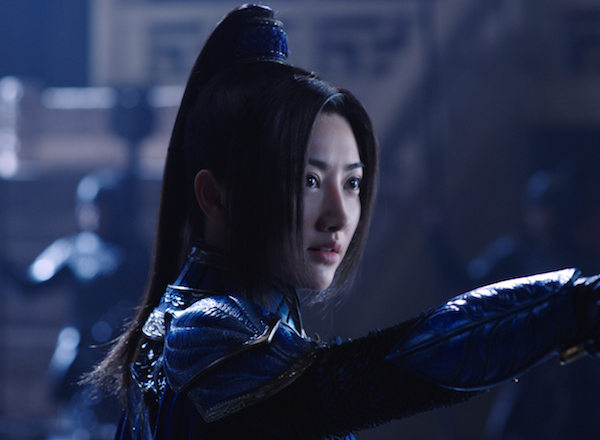Zhang Yimou’s “The Great Wall” does not have the singular white hero many feared it would.
Instead, as it turns out, the $150-million budget project, due for American release this Friday, is the tale of Chinese heroism and camaraderie held up to the face of evil, led by a strong female warrior, more than anything else.

Jing Tian, Matt Damon and Andy Lau in “The Great Wall” (Universal Pictures)
Zhang, speaking to Kore, said he felt the whitewashing controversy was unfair to Damon. “Matt has a lot of respect for Chinese culture, Asian culture, Asian people,” Zhang said through an interpreter. “So he was very upset that he was mistaken as somebody who would do something like that.”
Controversy before the release of a project is “something he’s used to,” Zhang said. He has “many times made a movie and even before it came out, people already had their own expectations and started talking about it as if they had seen the movie. … That’s what happens nowadays. That’s what people do. They like to guess what it’s about. Ultimately, as an artist, you cannot speak for the film. You’ve got to let the film speak for itself. The art has got to speak for itself.”
 Director Zhang Yimou on the set of “The Great Wall” (Jasin Boland/Universal Pictures)
Director Zhang Yimou on the set of “The Great Wall” (Jasin Boland/Universal Pictures)
The heroine
It’s fair to call Jing Tian the standout hero of the story. Tian plays Lin Mae, the only female troop leader among men in The Nameless Order, who will stop at no lengths to protect her beloved country from the Tao Tei — giant, hive-minded monsters hell-bent on swarming the safe villages beyond the wall.
The Order is a 100,000-strong elite army that has long kept the secret of the Tao Tei from China. The monsters were inspired by a mythical Chinese creature, the Taotie, which were said to rise every 60 years to feast on humankind.
Lin’s troop is one of five, led by General Shao (Zhang Hanyu). When two battle-scarred Western mercenaries, William Garin (Damon) and Pero Tovar (Pedro Pascal) arrive at the Great Wall seeking wealth and power in the form of black powder only created by the Chinese, they are captured by the soldiers and bound, against their will, to the secrecy of the monsters’ existence.
Willem Dafoe plays Sir Ballard, another Westerner trapped at the wall. An extensive Chinese supporting cast is led by the iconic Andy Lau, former K-pop group EXO member Lu Han and Eddie Peng.
Garin, who proves himself an excellent marksman, and Commander Lin form a strong friendship based on trust. When the monsters prove too intelligent to stop, all chaos breaks loose, and the heroes — you guessed it! — must step up to save the world. While Garin is loyal by Lin’s side, it’s the female warrior whose determination saves China, and her final shot that clinches victory.

Jing Tian plays heroine Commander Lin Mae in “The Great Wall” (Universal Pictures)
“The core concept of the story is of somebody coming from the West and being affected, being moved, inspired, by the Chinese,” Zhang — whose name is behind some of China’s largest box office and international hits, including “Hero,” “House of Flying Daggers” and even the 2008 Beijing Olympics opening and closing ceremonies — said, pointing to the character Lin as the symbol of that influence.
“In the East, if you think about it, we really love the idea of having a female hero,” he said. “If you think of Mulan, if you think about the concept in that time, [a female hero] is something we revere. … At that time in the West, there probably wouldn’t be any female heroes and female warriors. So [the message] is something that we really want to make sure to deliver to the audience.”
 Director Zhang Yimou and Matt Damon on the set of “The Great Wall” (Jasin Boland/Universal Pictures)
Director Zhang Yimou and Matt Damon on the set of “The Great Wall” (Jasin Boland/Universal Pictures)
The controversy
The film suffered an unsavory beginning — months ago, the internet had a strong reaction to the release of the first trailer, which showed Matt Damon wielding a bow and arrow, in Chinese warrior garb, on the Great Wall. He was a hero in that trailer, arguably the only distinguishable hero, voiceover and all, and was thus labeled as Hollywood’s latest cast butchering, of whitewashing and of the “white savior.”
Damon, then, voiced his disappointment at negative fan and media reactions, and said no one should judge a film based on a 30-second trailer. His character, he said, had always been intended to be European. Zhang had backed the headlining star of his first-ever English project, telling press that while Damon was the film’s hero, so, too, were four others, all Chinese.
“The Great Wall”‘s whitewashing controversy — as necessary and important as it is in other cases — was, it seems, to a misleading trailer edit.

“The Great Wall” is the largest U.S.-China co-production to date. (Universal Pictures)
East Meets West
As an East-meets-West production, the film presented a challenge as a balancing act.
“The East and West [have to] come together and appreciate the story,” Zhang said. “Sometimes you think about, from the Chinese perspective, that the story might be too simple. And they want it more complicated. But sometimes, from the Western side, they’ll go, ‘Well, it’s too complicated.’ They want something more direct. [It’s about] planning that balance. … It remains to be seen, but [I] hope that we did find that balance.”
“The Great Wall” was written by Tony Gilroy (who penned the “Bourne” series), Doug Miro and Carlo Bernard, and is presented by Legendary Pictures (which was bought by the Chinese Wanda Group last year) and Universal Pictures, working with China Film and Le Vision Pictures (owned by LeEco, the Chinese online video giant).
As the most expensive film ever shot in China, and as the first test of its scale of how a U.S.-China co-production can perform internationally in the wake of unprecedented Chinese investment pouring into Hollywood, the stakes are high.
All the while, Zhang said he looks forward to a film industry that progresses toward a broader understanding of all cultures, not just American or Chinese.
“The idea is to be willing to understand voices other than our own, so as to grow as the world grows, and the more globalization [there is], the more we know about each other,” he said.





